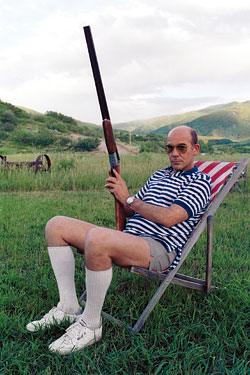Death by Gonzo
No one was more ambivalent about his own legend than Hunter Thompson.
Hunter Thompson, whom I knew off and on for 33 years and introduced to Rolling Stone, would have laughed that summer ’08 is turning out to be his season. There’s Bill McKeen’s new biography, Outlaw Journalist, which benignly covers his rise and fall in the sixties and seventies and then his slow crash, beginning in the eighties. There’s Jann Wenner’s Gonzo, an “oral biography” without narrative, which dumps a surprising amount of shmutz on his old star, despite its professions of brotherly love. And there’s Alex Gibney’s Gonzo, a documentary with narrative by Johnny Depp, which restricts itself to the nascent legend, before Thompson found, then lost himself.
When I first met him, there hadn’t yet been much “gonzo”—mad, self-referential spontaneity—about him. He’d had a best seller in 1966, Hell’s Angels—a group he’d followed around for a year in his old Volvo, just like a regular reporter. The book was controlled, even “sociological.” He’d been working for Dow Jones as a stringer in South America, was married, had a son, and, for financial reasons, needed a magazine base between books.
The gonzo stuff started partly out of frustration—at Warren Hinckle’s Scanlan’s magazine the year before he came to Rolling Stone. There was a piece called “The Temptations of Jean-Claude Killy,” about the French ski champ being groomed as a TV pitchman. It had originally been done for Playboy but was rejected—Killy was so boring Thompson said he’d had to mock him “to get the story up on its legs.” The full flowering, though, came with “The Kentucky Derby Is Decadent & Depraved,” in which Hunter ignored the race entirely to concentrate on those in the box seats, his old class enemies from Louisville, where he’d grown up. In an admittedly drunken and speed-driven screed, he excoriated them.
He didn’t think much of either piece. He hadn’t even wanted to turn the second one in: “It’s just gibberish,” he’d told the wicked, one-eyed Hinckle. “When gonzo first happened, Hunter’s reaction was terrible guilt,” Sandy Conklin, his first, long-suffering wife, says in Wenner’s Gonzo. “They didn’t get it. They said it was great, but Hunter knew it wasn’t.” But later, she told McKeen, he’d perceived that an “avenue” had opened up for him, that he’d found something people liked, and would pay for.
Read the whole review.

No comments:
Post a Comment